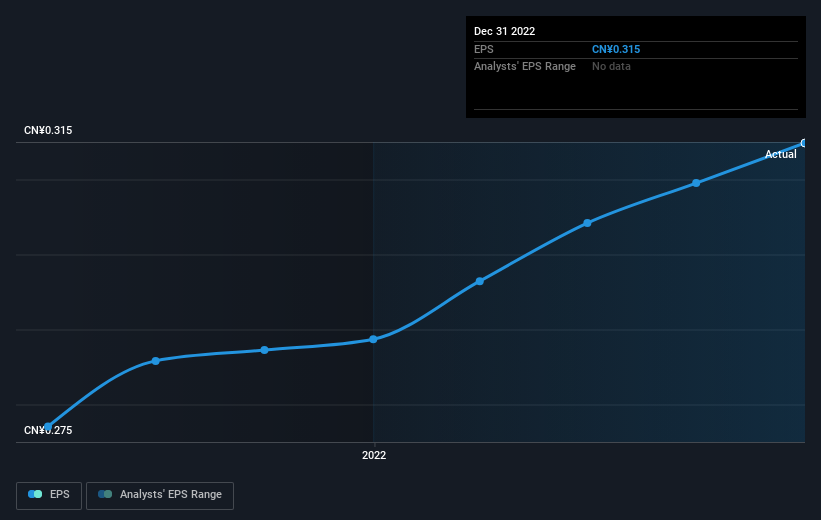Jinshang Bank (HKG:2558) sheds 8.5% this week, as yearly returns fall more in line with earnings growth

It can certainly be frustrating when a stock does not perform as hoped. But when the market is down, you're bound to have some losers. The Jinshang Bank Co., Ltd. (HKG:2558) is down 12% over three years, but the total shareholder return is 14% once you include the dividend. That's better than the market which declined 11% over the last three years. On top of that, the share price is down 8.5% in the last week.
Since Jinshang Bank has shed HK$642m from its value in the past 7 days, let's see if the longer term decline has been driven by the business' economics.
See our latest analysis for Jinshang Bank
In his essay The Superinvestors of Graham-and-Doddsville Warren Buffett described how share prices do not always rationally reflect the value of a business. One way to examine how market sentiment has changed over time is to look at the interaction between a company's share price and its earnings per share (EPS).
Although the share price is down over three years, Jinshang Bank actually managed to grow EPS by 4.0% per year in that time. This is quite a puzzle, and suggests there might be something temporarily buoying the share price. Or else the company was over-hyped in the past, and so its growth has disappointed.
Given that EPS is up and the share price is down, it seems clear the market is less excited about the business than it was. Having said that, if the EPS gains continue we'd expect the share price to improve, longer term.
The image below shows how EPS has tracked over time (if you click on the image you can see greater detail).

It's probably worth noting that the CEO is paid less than the median at similar sized companies. But while CEO remuneration is always worth checking, the really important question is whether the company can grow earnings going forward. It might be well worthwhile taking a look at our free report on Jinshang Bank's earnings, revenue and cash flow.
What About Dividends?
It is important to consider the total shareholder return, as well as the share price return, for any given stock. The TSR incorporates the value of any spin-offs or discounted capital raisings, along with any dividends, based on the assumption that the dividends are reinvested. Arguably, the TSR gives a more comprehensive picture of the return generated by a stock. As it happens, Jinshang Bank's TSR for the last 3 years was 14%, which exceeds the share price return mentioned earlier. The dividends paid by the company have thusly boosted the total shareholder return.
A Different Perspective
Pleasingly, Jinshang Bank's total shareholder return last year was 12%. That's including the dividend. That gain actually surpasses the 5% TSR it generated (per year) over three years. Given the track record of solid returns over varying time frames, it might be worth putting Jinshang Bank on your watchlist. I find it very interesting to look at share price over the long term as a proxy for business performance. But to truly gain insight, we need to consider other information, too. Even so, be aware that Jinshang Bank is showing 1 warning sign in our investment analysis , you should know about...
Of course Jinshang Bank may not be the best stock to buy. So you may wish to see this free collection of growth stocks.
Please note, the market returns quoted in this article reflect the market weighted average returns of stocks that currently trade on Hong Kong exchanges.
New: Manage All Your Stock Portfolios in One Place
We've created the ultimate portfolio companion for stock investors, and it's free.
• Connect an unlimited number of Portfolios and see your total in one currency
• Be alerted to new Warning Signs or Risks via email or mobile
• Track the Fair Value of your stocks
Have feedback on this article? Concerned about the content? Get in touch with us directly. Alternatively, email editorial-team (at) simplywallst.com.
This article by Simply Wall St is general in nature. We provide commentary based on historical data and analyst forecasts only using an unbiased methodology and our articles are not intended to be financial advice. It does not constitute a recommendation to buy or sell any stock, and does not take account of your objectives, or your financial situation. We aim to bring you long-term focused analysis driven by fundamental data. Note that our analysis may not factor in the latest price-sensitive company announcements or qualitative material. Simply Wall St has no position in any stocks mentioned.
About SEHK:2558
Flawless balance sheet with solid track record.

